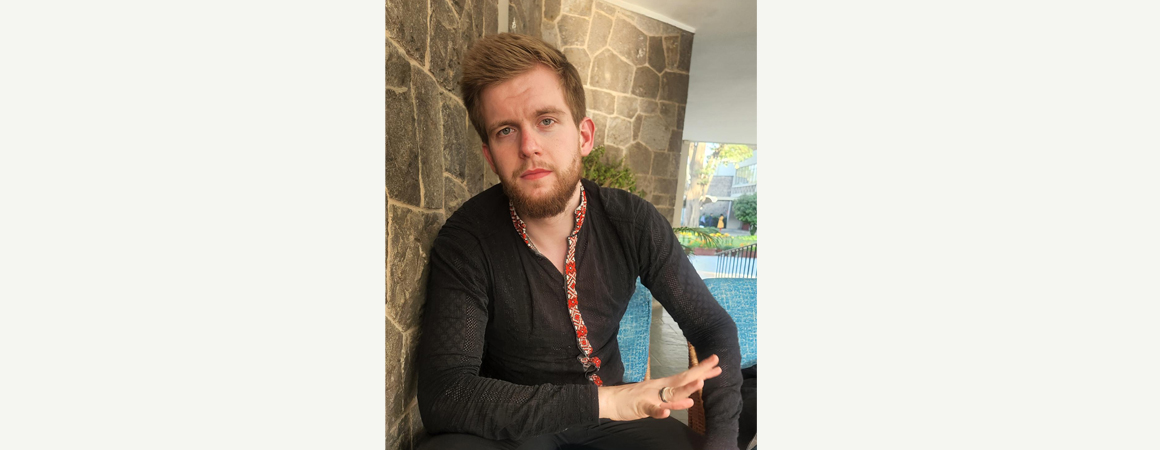Youngest Ukraine MP calls for India to shift position on war, says he boycotted Lavrov session in New Delhi.
Russia cannot claim a “monopoly” on the relationships of the Soviet Union, said a Ukrainian Member of Parliament (MP), who hoped India’s position on the war of Ukraine will “evolve” to one that is more supportive of Kyiv. The youngest MP in the Ukrainian parliament, 27-year-old Sviatoslav Yurash, has fought in the Ukraine war himself, and has been nicknamed the “MP with an AK-47”, had earlier visited India in 2015 as a student on an exchange programme at Calcutta (Kolkata) University.
He said there are many Ukrainians like him who love India, while many Indian citizens who went to Ukraine to study chose to live on there, even after the Government’s evacuation operations in March 2022. However, Mr. Yurash said that the governments of the two countries “lack engagement” and hence have differences in position on the war. Although he appreciated India’s humanitarian aid to Ukraine and PM Modi’s “era of war” statement last year, Mr. Yurash said he wanted to stress that India’s traditional relationship with Russia, also included Ukraine, as both were part of the Soviet Union.
“We need to explain our story [in India], explain the fact that the friendship [India] had with Soviet Union, it does not belong to Russia along, [Ukraine was] a critical part of it as well. Russians do not have a monopoly on the old relationships of the Soviet Union,” he said.
In the past few months, the Ukrainian government has expressed its disappointment with India, especially over India’s refusal to vote for resolutions criticising Russia at the UN, in a number of ways. In July 2022, President Zelensky recalled his Ambassador to India, and has not yet sent a replacement, and also put the names of three Indians, including the chief of the National Security Advisory Board (NSAB) on a “blacklist”. And last month, the Head of Ukraine’s Foreign Affairs Committee in parliament called for the U.S. to sanction India and China for continuing to buy increasing quantities of Russian oil.
When asked, Mr. Yurash said that these incidents did not represent a strategic position in Ukraine, but more an emotional one, as there is some “hurt” over the war. “Part of the message I take back to Kiev is that we must expand our engagement with India. I want to focus on the fact that India is a country that will lead this century,” Mr. Yurash told The Hindu, adding that if “India is to lead, it needs to take a stand and engage with different positions from its own.” He also said that as India is President of G20, Ukraine would welcome a visit by Prime Minister Narendra Modi, akin to the visit by Indonesian President Joko Widodo to Kyiv and Moscow last year.
Mr. Yurash, a member of Ukrainian President Volodymyr Zelensky’s “Servant of the People” party and on the parliamentary committee of foreign affairs, was a special invitee at the Ministry of External Affairs and ORF-run annual “Raisina Dialogue” Conference in Delhi this month. However, he said that he and a number of “Young Raisina Fellows” at the event had decided to boycott the session with Russian Foreign Minister Sergey Lavrov as he said he didn’t want to “legitimize” what was said at the session.
When asked about the boycott, Russian diplomats told The Hindu that the hall at the session last week was “fully booked” and that no one present had “noticed” the absence of any delegates. They also pointed out that the Russian delegation had not boycotted any of the other events, indicating a number of sessions with European and U.S. delegates that had been sharply critical of Russia.
During the session, Mr. Lavrov had accused Ukraine and other western countries backing it of refusing to come to the table for talks, and said President Zelensky had passed a decree making talks with Russian President Vladimir Putin illegal. Mr. Yurash responded that Ukraine had participated in several rounds of talks after the Russian invasion in February 2022, but that while the war continues and Russian troops remain in Ukrainian territory, it would be hard to foresee genuine or productive talks between them.
“Ukraine gave up the third biggest nuclear arsenal in the world (in 1994) in return for guarantees, integrity, security, and sovereignty. Russia has violated all three of them, time and time and time again. The point is, agreements with Russia are not worth the paper they are written on,” Mr. Yurash said, when asked for a response.
Russia doesn’t have monopoly on Soviet ties, Ukraine friend of India too: Ukraine MP Yurash
Youngest Ukraine MP calls for India to shift position on war, says he boycotted Lavrov session in New Delhi.
Russia cannot claim a “monopoly” on the relationships of the Soviet Union, said a Ukrainian Member of Parliament (MP), who hoped India’s position on the war of Ukraine will “evolve” to one that is more supportive of Kyiv. The youngest MP in the Ukrainian parliament, 27-year-old Sviatoslav Yurash, has fought in the Ukraine war himself, and has been nicknamed the “MP with an AK-47”, had earlier visited India in 2015 as a student on an exchange programme at Calcutta (Kolkata) University.
He said there are many Ukrainians like him who love India, while many Indian citizens who went to Ukraine to study chose to live on there, even after the Government’s evacuation operations in March 2022. However, Mr. Yurash said that the governments of the two countries “lack engagement” and hence have differences in position on the war. Although he appreciated India’s humanitarian aid to Ukraine and PM Modi’s “era of war” statement last year, Mr. Yurash said he wanted to stress that India’s traditional relationship with Russia, also included Ukraine, as both were part of the Soviet Union.
“We need to explain our story [in India], explain the fact that the friendship [India] had with Soviet Union, it does not belong to Russia along, [Ukraine was] a critical part of it as well. Russians do not have a monopoly on the old relationships of the Soviet Union,” he said.
In the past few months, the Ukrainian government has expressed its disappointment with India, especially over India’s refusal to vote for resolutions criticising Russia at the UN, in a number of ways. In July 2022, President Zelensky recalled his Ambassador to India, and has not yet sent a replacement, and also put the names of three Indians, including the chief of the National Security Advisory Board (NSAB) on a “blacklist”. And last month, the Head of Ukraine’s Foreign Affairs Committee in parliament called for the U.S. to sanction India and China for continuing to buy increasing quantities of Russian oil.
When asked, Mr. Yurash said that these incidents did not represent a strategic position in Ukraine, but more an emotional one, as there is some “hurt” over the war. “Part of the message I take back to Kiev is that we must expand our engagement with India. I want to focus on the fact that India is a country that will lead this century,” Mr. Yurash told The Hindu, adding that if “India is to lead, it needs to take a stand and engage with different positions from its own.” He also said that as India is President of G20, Ukraine would welcome a visit by Prime Minister Narendra Modi, akin to the visit by Indonesian President Joko Widodo to Kyiv and Moscow last year.
Mr. Yurash, a member of Ukrainian President Volodymyr Zelensky’s “Servant of the People” party and on the parliamentary committee of foreign affairs, was a special invitee at the Ministry of External Affairs and ORF-run annual “Raisina Dialogue” Conference in Delhi this month. However, he said that he and a number of “Young Raisina Fellows” at the event had decided to boycott the session with Russian Foreign Minister Sergey Lavrov as he said he didn’t want to “legitimize” what was said at the session.
When asked about the boycott, Russian diplomats told The Hindu that the hall at the session last week was “fully booked” and that no one present had “noticed” the absence of any delegates. They also pointed out that the Russian delegation had not boycotted any of the other events, indicating a number of sessions with European and U.S. delegates that had been sharply critical of Russia.
During the session, Mr. Lavrov had accused Ukraine and other western countries backing it of refusing to come to the table for talks, and said President Zelensky had passed a decree making talks with Russian President Vladimir Putin illegal. Mr. Yurash responded that Ukraine had participated in several rounds of talks after the Russian invasion in February 2022, but that while the war continues and Russian troops remain in Ukrainian territory, it would be hard to foresee genuine or productive talks between them.
“Ukraine gave up the third biggest nuclear arsenal in the world (in 1994) in return for guarantees, integrity, security, and sovereignty. Russia has violated all three of them, time and time and time again. The point is, agreements with Russia are not worth the paper they are written on,” Mr. Yurash said, when asked for a response.






NO COMMENT